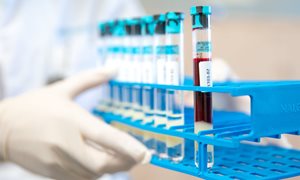15 November 2018
To determine the optimal therapeutic dose, effect on kidney function, and adverse effects of a human recombinant alkaline phosphatase in patients who are critically ill with sepsis-associated AKI.
The STOP-AKI trial was an international (53 recruiting sites), randomized, double-blind, placebo-controlled, dose-finding, adaptive phase 2a/2b study in 301 adult patients admitted to the intensive care unit with a diagnosis of sepsis and AKI. Patients were enrolled between December 2014 and May 2017, and follow-up was conducted for 90 days. The final date of follow-up was August 14, 2017.
In the intention-to-treat analysis, in part 1 of the trial, patients were randomized to receive recombinant alkaline phosphatase in a dosage of 0.4 mg/kg (n = 31), 0.8 mg/kg (n = 32), or 1.6 mg/kg (n = 29) or placebo (n = 30), once daily for 3 days, to establish the optimal dose. The optimal dose was identified as 1.6 mg/kg based on modeling approaches and adverse events. In part 2, 1.6 mg/kg (n = 82) was compared with placebo (n = 86).
The primary end point was the time-corrected area under the curve of the endogenous creatinine clearance for days 1 through 7, divided by 7 to provide a mean daily creatinine clearance (AUC1-7 ECC). Incidence of fatal and nonfatal (serious) adverse events ([S]AEs) was also determined.
Overall, 301 patients were enrolled (men, 70.7%; median age, 67 years [interquartile range {IQR}, 59-73]). From day 1 to day 7, median ECC increased from 26.0 mL/min (IQR, 8.8 to 59.5) to 65.4 mL/min (IQR, 26.7 to 115.4) in the recombinant alkaline phosphatase 1.6-mg/kg group vs from 35.9 mL/min (IQR, 12.2 to 82.9) to 61.9 mL/min (IQR, 22.7 to 115.2) in the placebo group (absolute difference, 9.5 mL/min [95% CI, -23.9 to 25.5]; P = .47). Fatal adverse events occurred in 26.3% of patients in the 0.4-mg/kg recombinant alkaline phosphatase group; 17.1% in the 0.8-mg/kg group, 17.4% in the 1.6-mg/kg group, and 29.5% in the placebo group. Rates of nonfatal SAEs were 21.0% for the 0.4-mg/kg recombinant alkaline phosphatase group, 14.3% for the 0.8-mg/kg group, 25.7% for the 1.6-mg/kg group, and 20.5% for the placebo group.
Among patients who were critically ill with sepsis-associated acute kidney injury, human recombinant alkaline phosphatase compared with placebo did not significantly improve short-term kidney function. Further research is necessary to assess other clinical outcomes.
 Sepsis-associated acute kidney injury (AKI) adversely affects long-term kidney outcomes and survival. Administration of the detoxifying enzyme alkaline phosphatase may improve kidney function and survival.
Sepsis-associated acute kidney injury (AKI) adversely affects long-term kidney outcomes and survival. Administration of the detoxifying enzyme alkaline phosphatase may improve kidney function and survival.
To determine the optimal therapeutic dose, effect on kidney function, and adverse effects of a human recombinant alkaline phosphatase in patients who are critically ill with sepsis-associated AKI.
The STOP-AKI trial was an international (53 recruiting sites), randomized, double-blind, placebo-controlled, dose-finding, adaptive phase 2a/2b study in 301 adult patients admitted to the intensive care unit with a diagnosis of sepsis and AKI. Patients were enrolled between December 2014 and May 2017, and follow-up was conducted for 90 days. The final date of follow-up was August 14, 2017.
In the intention-to-treat analysis, in part 1 of the trial, patients were randomized to receive recombinant alkaline phosphatase in a dosage of 0.4 mg/kg (n = 31), 0.8 mg/kg (n = 32), or 1.6 mg/kg (n = 29) or placebo (n = 30), once daily for 3 days, to establish the optimal dose. The optimal dose was identified as 1.6 mg/kg based on modeling approaches and adverse events. In part 2, 1.6 mg/kg (n = 82) was compared with placebo (n = 86).
The primary end point was the time-corrected area under the curve of the endogenous creatinine clearance for days 1 through 7, divided by 7 to provide a mean daily creatinine clearance (AUC1-7 ECC). Incidence of fatal and nonfatal (serious) adverse events ([S]AEs) was also determined.
Overall, 301 patients were enrolled (men, 70.7%; median age, 67 years [interquartile range {IQR}, 59-73]). From day 1 to day 7, median ECC increased from 26.0 mL/min (IQR, 8.8 to 59.5) to 65.4 mL/min (IQR, 26.7 to 115.4) in the recombinant alkaline phosphatase 1.6-mg/kg group vs from 35.9 mL/min (IQR, 12.2 to 82.9) to 61.9 mL/min (IQR, 22.7 to 115.2) in the placebo group (absolute difference, 9.5 mL/min [95% CI, -23.9 to 25.5]; P = .47). Fatal adverse events occurred in 26.3% of patients in the 0.4-mg/kg recombinant alkaline phosphatase group; 17.1% in the 0.8-mg/kg group, 17.4% in the 1.6-mg/kg group, and 29.5% in the placebo group. Rates of nonfatal SAEs were 21.0% for the 0.4-mg/kg recombinant alkaline phosphatase group, 14.3% for the 0.8-mg/kg group, 25.7% for the 1.6-mg/kg group, and 20.5% for the placebo group.
Among patients who were critically ill with sepsis-associated acute kidney injury, human recombinant alkaline phosphatase compared with placebo did not significantly improve short-term kidney function. Further research is necessary to assess other clinical outcomes.
Related news items
.aspx?width=4000&height=2659&ext=.jpg&type=BlockColumn1Zoom1)
Antihypotensive agent disrupts the immune system in sepsis
11 June 2020 Patients who go into shock caused by sepsis are treated with norepinephrine. Researchers from Radboudumc published results in today’s American Journal of Respiratory and Critical Care Medicine revealing that its use is not without drawbacks. go to page
A personal touch of Jelle Zwaag
19 May 2019 In order to promote interaction amongst colleagues within RIMLS, we have a ‘personal touch’ series setting employees in the spotlight. A light-hearted manner to learn about the colleagues you know and those you don’t. This week: Jelle Zwaag. go to page
Supervisor of the year Matthijs Kox
16 January 2019 For the second time the RIMLS PhD council organized the Supervisor election with many nominees. This year's winner is Matthijs Kox, theme Infectious diseases and global health. go to page
Volunteering to become ill to help researchers understand infectious diseases
3 December 2018 Radboudumc has combined its research into controlled human infection models to create a new program: the Radboudumc Controlled Human Infection Models (RCHIM). go to page
